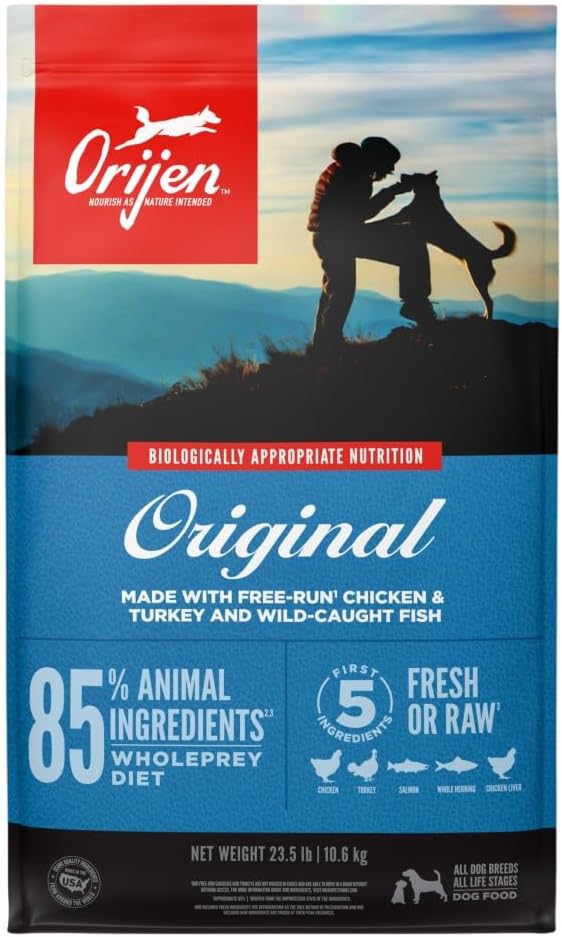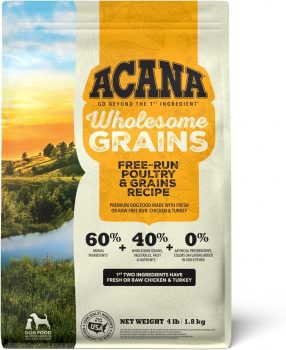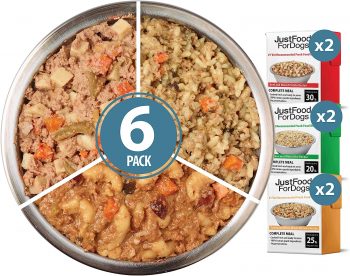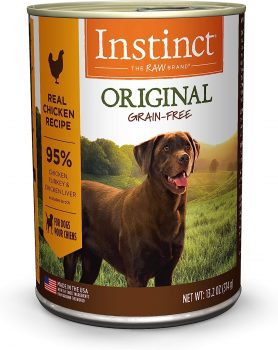German Shepherds are known for their intelligence, strength, and versatility. A proper diet is critical to maintain their health and vitality. This comprehensive guide will delve into the ideal diet for German Shepherds, addressing their unique nutritional needs and how to meet them.
Understanding the Nutritional Needs of German Shepherds
German Shepherds, being large and active dogs, require a diet that supports their energy needs and promotes good health. Their diet must include a balance of proteins, fats, carbohydrates, vitamins, and minerals.
Our 5 Top Foods for German Shepherds
The diets were selected by our founder Justin Palmer, a certified canine nutrition expert, specifically with German Shepherds in mind:
| Food | Pros | Cons |
|---|---|---|
|
|
|
|

Check Today's Price on: |
|
|

Check Today's Price on: |
|
|

Check Today's Price on: |
|
|

Check Today's Price on: |
|
|
High-Quality Protein: The Foundation of Muscle Health
Protein is crucial for muscle maintenance, repair, and growth in German Shepherds. High-quality protein sources like chicken, beef, lamb, and fish should form the bulk of their diet. The protein content should be adjusted according to their life stage, activity level, and health status.
Essential Fats for Energy and Coat Health
Fats are a concentrated source of energy and are essential for a healthy coat and skin. Sources of good fats for German Shepherds include fish oil, flaxseed, and chicken fat. The diet should have a balance of omega-3 and omega-6 fatty acids.
Carbohydrates for Sustained Energy
Carbohydrates provide German Shepherds with energy and dietary fiber. Whole grains like brown rice and barley, as well as vegetables, are good carbohydrate sources. However, these should be given in moderation to avoid weight gain.
Special Dietary Considerations for German Shepherds
German Shepherds have specific dietary needs due to their size, activity level, and predisposition to certain health issues.
Joint Health: Nutrients for Mobility
Due to their size and activity, German Shepherds are prone to joint problems like hip dysplasia. A diet rich in glucosamine, chondroitin, and omega-3 fatty acids can help support joint health and reduce inflammation.
Digestive Health: Managing Sensitivities
German Shepherds are known for their sensitive digestion. Probiotics, easily digestible proteins, and fiber-rich foods can promote a healthy gut. Avoiding common allergens like corn and wheat may also be beneficial.
Weight Management: Balancing Diet and Exercise
Maintaining an ideal weight is crucial for German Shepherds. Overweight dogs are more prone to health issues like diabetes and joint problems. A balanced diet, portion control, and regular exercise are key.
The Role of Supplements in a German Shepherd’s Diet
While a well-balanced diet should provide all necessary nutrients, supplements can be beneficial in some cases.
Joint Supplements
Supplements containing glucosamine and chondroitin can be beneficial for German Shepherds, especially those with joint issues or those that are highly active.
Skin and Coat Supplements
Omega fatty acid supplements can improve skin and coat health, particularly for German Shepherds with dry skin or dull coats.
Hydration: An Often Overlooked Aspect
Adequate hydration is essential for German Shepherds. Fresh, clean water should be available at all times, especially if the dog is primarily on a dry food diet.
Feeding Practices for Optimal Health
The way you feed your German Shepherd is as important as what you feed them.
Consistent Feeding Schedule
Feeding your German Shepherd at regular intervals helps regulate their digestion and energy levels. Two meals a day is generally recommended for adult dogs.
Appropriate Portion Sizes
The amount of food required depends on the dog’s age, size, and activity level. Consult with a veterinarian to determine the right portion sizes for your dog.
An ideal diet for German Shepherds should be tailored to their unique nutritional needs, considering their size, activity level, and health predispositions. A balanced diet comprising high-quality proteins, essential fats, carbohydrates, and necessary supplements, along with a consistent feeding routine and proper hydration, is key to maintaining their health and vitality. Always consult with a veterinarian for personalized dietary advice for your German Shepherd.
What Health Issues Are German Shepherds Prone To, and How Can a Proper Diet Help?
German Shepherds, renowned for their intelligence and loyalty, are among the most popular dog breeds worldwide. While they are generally robust and healthy, they are prone to certain health issues. A proper diet plays a vital role in preventing and managing these conditions, ensuring a long, healthy life for these noble dogs.
Recognizing Common Health Concerns in German Shepherds
German Shepherds are susceptible to specific health problems due to their size, genetics, and active nature. Understanding these issues is crucial for effective prevention and management through diet and lifestyle.
Joint Problems: Hip and Elbow Dysplasia
Hip and elbow dysplasia are common in German Shepherds, often leading to arthritis and mobility issues. A diet rich in omega-3 fatty acids, glucosamine, and chondroitin can support joint health and reduce inflammation. Foods like fish and supplements designed for joint health can be beneficial.
Digestive Issues: Managing Sensitive Stomachs
German Shepherds often have sensitive stomachs, prone to conditions like bloat and colitis. A diet with easily digestible proteins, probiotics, and appropriate fiber levels can promote digestive health. Avoiding fatty, spicy, or rich foods is also essential.
Skin Allergies: The Role of Diet in Skin Health
These dogs can suffer from skin allergies, which can be exacerbated by dietary triggers. Hypoallergenic diets, or those rich in omega-3 and omega-6 fatty acids, can improve skin health and alleviate allergic symptoms.
Weight Management: Preventing Obesity
Due to their large size and less active periods, German Shepherds can become overweight, leading to various health issues. A balanced diet with controlled calorie intake and regular exercise is crucial for maintaining an ideal weight.
Nutritional Strategies for Optimal Health in German Shepherds
A well-planned diet can significantly impact the health and well-being of German Shepherds. Key components of such a diet include high-quality proteins, balanced fats, complex carbohydrates, vitamins, and minerals.
High-Quality Protein Sources for Muscle Maintenance
Proteins are essential for muscle development and overall health. Lean meats like chicken, beef, and fish provide the amino acids necessary for a German Shepherd’s health, particularly for puppies and active adults.
Essential Fats for Energy and Coat Health
Fats are a vital energy source and essential for maintaining a healthy coat. Omega-3 and omega-6 fatty acids, found in fish oil and flaxseed, are particularly beneficial for German Shepherds.
Carbohydrates and Fiber for Digestive Health
Carbohydrates provide energy and fiber aids digestion. Whole grains and vegetables are good sources, but they should be given in moderation to prevent weight gain and maintain stable blood sugar levels.
Vitamins and Minerals for Overall Well-being
A balanced diet should include essential vitamins and minerals. These can be found in commercial dog foods formulated for large breeds like German Shepherds, as well as in fruits and vegetables.
Addressing Dietary Allergies and Sensitivities
Food allergies and sensitivities can affect a German Shepherd’s overall health. Identifying and managing these is critical.
Identifying Common Allergens
Common allergens include certain proteins, grains, and artificial additives. Symptoms of allergies include skin irritation, digestive problems, and ear infections.
Hypoallergenic Diets for Sensitive Dogs
In cases of severe allergies or sensitivities, a hypoallergenic diet may be necessary. Such diets often use novel protein sources and limited ingredients to reduce the risk of allergic reactions.
The Role of Supplements in a German Shepherd’s Diet
While a balanced diet is key, certain supplements can be beneficial, especially for dogs with specific health issues.
Joint Health Supplements
Supplements containing glucosamine, chondroitin, and MSM can support joint health, particularly in older dogs or those with joint issues.
Skin and Coat Supplements
Omega-3 and omega-6 supplements can improve the condition of a German Shepherd’s skin and coat, reducing the risk of allergies and dry skin.
Hydration: Essential for Overall Health
Proper hydration is crucial for German Shepherds, particularly for those on a dry food diet. Ensure they have constant access to fresh water to support kidney health and overall well-being.
Feeding Practices for German Shepherds
The manner in which German Shepherds are fed plays a significant role in their health.
Consistent Feeding Schedule for Digestive Health
Regular feeding times help regulate digestion and energy levels. For adult German Shepherds, two meals per day are recommended.
Appropriate Portion Sizes for Weight Management
Portion control is vital to prevent overfeeding. The amount of food should be based on the dog’s age, size, activity level, and health status.
Conclusion
A proper diet is crucial for preventing and managing health issues in German Shepherds. By understanding their specific needs and providing a balanced diet rich in proteins, fats, carbohydrates, and essential nutrients, owners can significantly impact their dogs’ health and longevity. Regular veterinary check-ups and personalized dietary advice are recommended to cater to each German Shepherd’s unique requirements.
Frequently Asked Questions About Feeding German Shepherds

1. What is the best type of food for a German Shepherd?
High-quality, protein-rich dog food is best for German Shepherds. Look for foods where real meat (like chicken, beef, or fish) is the primary ingredient. Avoid foods with high grain content and artificial additives, as German Shepherds can have sensitive stomachs.
2. How much food should I feed my German Shepherd each day?
The amount of food a German Shepherd needs varies with age, size, and activity level. Generally, an adult German Shepherd requires about 2 to 4 cups of dry dog food per day, divided into two meals. Always refer to feeding guidelines on the dog food package and consult your vet for personalized advice.
3. Can German Shepherds eat a grain-free diet?
Yes, German Shepherds can eat a grain-free diet, and it may be beneficial for those with grain sensitivities or allergies. Ensure the grain-free diet is well-balanced, providing all the necessary nutrients.
4. Is it safe to feed German Shepherds human food?
While some human foods are safe for German Shepherds in moderation, many are not. Safe options include plain cooked lean meats, certain fruits, and vegetables. Avoid toxic foods like chocolate, grapes, onions, and foods with artificial sweeteners like xylitol.
5. How often should I feed my adult German Shepherd?
Adult German Shepherds should ideally be fed twice a day – once in the morning and once in the evening. This helps in better digestion and energy regulation throughout the day.
6. Are there specific foods that promote a healthy coat in German Shepherds?
Foods rich in omega-3 and omega-6 fatty acids, like fish oil, flaxseed, and certain fish meats, are great for promoting a healthy coat and skin in German Shepherds. Many high-quality commercial dog foods are formulated to support coat health.
7. Do German Shepherds need dietary supplements?
Some German Shepherds might benefit from dietary supplements, especially those targeted for joint health or skin and coat improvement. However, supplements should only be added after consulting with a veterinarian.
8. Can German Shepherds eat dairy products?
Many German Shepherds are lactose intolerant, so dairy products should be given sparingly, if at all. Small amounts of yogurt or cheese can be okay but always monitor for signs of digestive upset.
9. How can I tell if my German Shepherd has a food allergy?
Signs of food allergies in German Shepherds include itching, skin rashes, ear infections, and gastrointestinal problems. If you suspect a food allergy, consult your veterinarian for an appropriate diet plan and possibly an elimination diet.
10. What’s the best way to switch my German Shepherd to a new food?
When switching to a new food, gradually introduce the new food over a period of 7-10 days. Start by mixing a small amount of the new food with the old, gradually increasing the proportion of new food to prevent digestive upset.
11. Is a raw food diet suitable for German Shepherds?
A raw food diet can be suitable for German Shepherds, but it requires careful planning to ensure it meets all nutritional needs and is safe. Consult a veterinarian before starting a raw diet to ensure it’s appropriate for your dog.
12. Should I feed my German Shepherd wet or dry food?
Both wet and dry foods can be suitable for German Shepherds. Dry food is beneficial for dental health, while wet food can be more hydrating and palatable. Some owners choose to mix both. The decision should be based on your dog’s health needs and preferences.
13. How can I prevent my German Shepherd from becoming overweight?
Prevent obesity in German Shepherds by maintaining a balanced diet, controlling portion sizes, limiting high-calorie treats, and ensuring they get regular exercise. Regular check-ups with a vet can also help monitor their weight.
14. Can German Shepherds be fed a vegetarian diet?
While German Shepherds can technically be fed a vegetarian diet, it’s challenging to meet their nutritional needs without animal proteins. Consult with a veterinarian to ensure any vegetarian diet is balanced and suitable for your dog.
15. What are healthy treatment options for German Shepherds?
Healthy treats for German Shepherds include small pieces of fruits like apples or carrots, lean-cooked meats, and specially formulated dog treats. Avoid giving treats that are high in fat or calories and always give treats in moderation.
 Check Today's Price on:
Check Today's Price on: Toledo, United States.
Toledo, United States.
